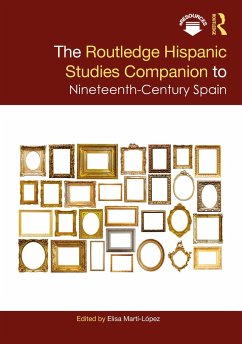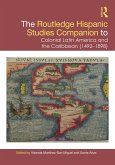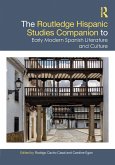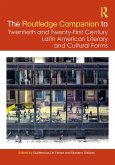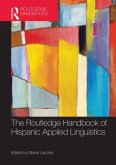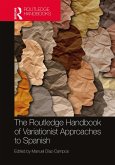The Routledge Hispanic Studies Companion to Nineteenth-Century Spain
Herausgeber: Martí-López, Elisa
The Routledge Hispanic Studies Companion to Nineteenth-Century Spain
Herausgeber: Martí-López, Elisa
- Gebundenes Buch
- Merkliste
- Auf die Merkliste
- Bewerten Bewerten
- Teilen
- Produkt teilen
- Produkterinnerung
- Produkterinnerung
The Routledge Hispanic Studies Companion to Nineteenth-Century Spain brings together an international team of expert contributors in this critical and innovative volume that redefines nineteenth-century Spain in a multi-national, multi-lingual, and transnational way. This interdisciplinary volume examines questions moving beyond the traditional concept of Spain as a singular, homogenous entity to a new understanding of Spain as an unstable set of multipolar and multilinguistic relations that can be inscribed in different translational ways. This invaluable resource will be of interest to advanced students and scholars in Hispanic Studies.…mehr
Andere Kunden interessierten sich auch für
![The Routledge Hispanic Studies Companion to Colonial Latin America and the Caribbean (1492-1898) The Routledge Hispanic Studies Companion to Colonial Latin America and the Caribbean (1492-1898)]() The Routledge Hispanic Studies Companion to Colonial Latin America and the Caribbean (1492-1898)308,99 €
The Routledge Hispanic Studies Companion to Colonial Latin America and the Caribbean (1492-1898)308,99 €![The Routledge Hispanic Studies Companion to Early Modern Spanish Literature and Culture The Routledge Hispanic Studies Companion to Early Modern Spanish Literature and Culture]() The Routledge Hispanic Studies Companion to Early Modern Spanish Literature and Culture309,99 €
The Routledge Hispanic Studies Companion to Early Modern Spanish Literature and Culture309,99 €![The Routledge Companion to Twentieth and Twenty-First Century Latin American Literary and Cultural Forms The Routledge Companion to Twentieth and Twenty-First Century Latin American Literary and Cultural Forms]() The Routledge Companion to Twentieth and Twenty-First Century Latin American Literary and Cultural Forms308,99 €
The Routledge Companion to Twentieth and Twenty-First Century Latin American Literary and Cultural Forms308,99 €![The Routledge Handbook of Hispanic Applied Linguistics The Routledge Handbook of Hispanic Applied Linguistics]() The Routledge Handbook of Hispanic Applied Linguistics316,99 €
The Routledge Handbook of Hispanic Applied Linguistics316,99 €![The Routledge Companion to English Language Studies The Routledge Companion to English Language Studies]() Janet MaybinThe Routledge Companion to English Language Studies163,99 €
Janet MaybinThe Routledge Companion to English Language Studies163,99 €![The Routledge Handbook of Variationist Approaches to Spanish The Routledge Handbook of Variationist Approaches to Spanish]() The Routledge Handbook of Variationist Approaches to Spanish309,99 €
The Routledge Handbook of Variationist Approaches to Spanish309,99 €![The Routledge Introduction to Qur'anic Arabic The Routledge Introduction to Qur'anic Arabic]() Munther YounesThe Routledge Introduction to Qur'anic Arabic221,99 €
Munther YounesThe Routledge Introduction to Qur'anic Arabic221,99 €-
-
-
The Routledge Hispanic Studies Companion to Nineteenth-Century Spain brings together an international team of expert contributors in this critical and innovative volume that redefines nineteenth-century Spain in a multi-national, multi-lingual, and transnational way. This interdisciplinary volume examines questions moving beyond the traditional concept of Spain as a singular, homogenous entity to a new understanding of Spain as an unstable set of multipolar and multilinguistic relations that can be inscribed in different translational ways. This invaluable resource will be of interest to advanced students and scholars in Hispanic Studies.
Hinweis: Dieser Artikel kann nur an eine deutsche Lieferadresse ausgeliefert werden.
Hinweis: Dieser Artikel kann nur an eine deutsche Lieferadresse ausgeliefert werden.
Produktdetails
- Produktdetails
- Verlag: Routledge
- Seitenzahl: 446
- Erscheinungstermin: 25. September 2020
- Englisch
- Abmessung: 250mm x 175mm x 28mm
- Gewicht: 944g
- ISBN-13: 9780815358244
- ISBN-10: 0815358245
- Artikelnr.: 59999158
- Herstellerkennzeichnung
- Libri GmbH
- Europaallee 1
- 36244 Bad Hersfeld
- gpsr@libri.de
- Verlag: Routledge
- Seitenzahl: 446
- Erscheinungstermin: 25. September 2020
- Englisch
- Abmessung: 250mm x 175mm x 28mm
- Gewicht: 944g
- ISBN-13: 9780815358244
- ISBN-10: 0815358245
- Artikelnr.: 59999158
- Herstellerkennzeichnung
- Libri GmbH
- Europaallee 1
- 36244 Bad Hersfeld
- gpsr@libri.de
Elisa Martí-López is Associate Professor Emerita of Spanish at Northwestern University, USA.
Introduction: Rethinking the Nineteenth Century and Spain: Critical
Configurations. 1 Caribbean siblings: sisterly affinities and differences
between Cuba and Puerto Rico in the nineteenth century 2 Good Spanish,
better Basques: culture, politics, and identity construction in the Basque
diaspora of the nineteenth century 3 The Cors de Clavé: popular music,
republicanism, and social regeneration 4 Health policies and liberal
reforms 5 Equatorial Guinea: colonization and cultural dislocation
(1827-1931) 6 Global Hispanophone cultural production in the
nineteenth-century Maghreb and the Ottoman Empire 7 Fortuny and the
Spanish-Moroccan War (1859-1860): battle paintings and orientalist
pictorial production 8 The Philippines in the context of the
nineteenth-century Spanish Empire 9 Nineteenth-century realism and
political economy: the plot against the equation 10 Colonial wars, gender,
and the nation in nineteenth-century Spain: soldiers' writings,
metropolitan views 11 Guidebooks, panoramas, and architecture: competing
national constructions in Catalonia and Spain 12 Navigating stereotypes and
perceptions of Spain 13 Partial protagonists: biography, fiction, and the
nineteenth-century legacy in Rosa Chacel and Benjamín Jarnés 14 Posterity
and periphery in late nineteenth-century Galicia 15 Urbanization in
upheaval: Spanish cities, agents and targets of a slow transformation 16
Spain and the visual culture of suffering 17 Recreating the homeland
abroad: migrants, settlers, and the Iberian identities in the Americas,
1870-1920 18 Ruins of civilization: the classics at the foundation of
Iberian nationalisms 19 Y ahora seremos españoles: the uncertainties of
Puerto Rican identity in the late Spanish Empire 20 The legacies of
Atlantic slavery in nineteenth-century Spain 21 Women in nineteenth-century
paintings: an imaginary album of daily life 22 Theater spaces in Barcelona,
1800-1850 23 Education and citizenship in the construction of the Spanish
State: from the Constitution of Cadiz to the creation of the Ministry of
Public Education (1812-1900) 24 The Yucatan Channel and the limits of
"Spain" in the mid-nineteenth century 25 Politics, affect, and the
negotiations of gender in Concepción Arenal's antislavery writings 26 "Los
que no pueden ser otra cosa": nineteenth-century state arts administration
and Spanish identity 27 The dream of a Federal Republic: United States
independence as a model for Rossend Arús i Arderiu's activism and freemason
ideology
Configurations. 1 Caribbean siblings: sisterly affinities and differences
between Cuba and Puerto Rico in the nineteenth century 2 Good Spanish,
better Basques: culture, politics, and identity construction in the Basque
diaspora of the nineteenth century 3 The Cors de Clavé: popular music,
republicanism, and social regeneration 4 Health policies and liberal
reforms 5 Equatorial Guinea: colonization and cultural dislocation
(1827-1931) 6 Global Hispanophone cultural production in the
nineteenth-century Maghreb and the Ottoman Empire 7 Fortuny and the
Spanish-Moroccan War (1859-1860): battle paintings and orientalist
pictorial production 8 The Philippines in the context of the
nineteenth-century Spanish Empire 9 Nineteenth-century realism and
political economy: the plot against the equation 10 Colonial wars, gender,
and the nation in nineteenth-century Spain: soldiers' writings,
metropolitan views 11 Guidebooks, panoramas, and architecture: competing
national constructions in Catalonia and Spain 12 Navigating stereotypes and
perceptions of Spain 13 Partial protagonists: biography, fiction, and the
nineteenth-century legacy in Rosa Chacel and Benjamín Jarnés 14 Posterity
and periphery in late nineteenth-century Galicia 15 Urbanization in
upheaval: Spanish cities, agents and targets of a slow transformation 16
Spain and the visual culture of suffering 17 Recreating the homeland
abroad: migrants, settlers, and the Iberian identities in the Americas,
1870-1920 18 Ruins of civilization: the classics at the foundation of
Iberian nationalisms 19 Y ahora seremos españoles: the uncertainties of
Puerto Rican identity in the late Spanish Empire 20 The legacies of
Atlantic slavery in nineteenth-century Spain 21 Women in nineteenth-century
paintings: an imaginary album of daily life 22 Theater spaces in Barcelona,
1800-1850 23 Education and citizenship in the construction of the Spanish
State: from the Constitution of Cadiz to the creation of the Ministry of
Public Education (1812-1900) 24 The Yucatan Channel and the limits of
"Spain" in the mid-nineteenth century 25 Politics, affect, and the
negotiations of gender in Concepción Arenal's antislavery writings 26 "Los
que no pueden ser otra cosa": nineteenth-century state arts administration
and Spanish identity 27 The dream of a Federal Republic: United States
independence as a model for Rossend Arús i Arderiu's activism and freemason
ideology
Introduction: Rethinking the Nineteenth Century and Spain: Critical
Configurations. 1 Caribbean siblings: sisterly affinities and differences
between Cuba and Puerto Rico in the nineteenth century 2 Good Spanish,
better Basques: culture, politics, and identity construction in the Basque
diaspora of the nineteenth century 3 The Cors de Clavé: popular music,
republicanism, and social regeneration 4 Health policies and liberal
reforms 5 Equatorial Guinea: colonization and cultural dislocation
(1827-1931) 6 Global Hispanophone cultural production in the
nineteenth-century Maghreb and the Ottoman Empire 7 Fortuny and the
Spanish-Moroccan War (1859-1860): battle paintings and orientalist
pictorial production 8 The Philippines in the context of the
nineteenth-century Spanish Empire 9 Nineteenth-century realism and
political economy: the plot against the equation 10 Colonial wars, gender,
and the nation in nineteenth-century Spain: soldiers' writings,
metropolitan views 11 Guidebooks, panoramas, and architecture: competing
national constructions in Catalonia and Spain 12 Navigating stereotypes and
perceptions of Spain 13 Partial protagonists: biography, fiction, and the
nineteenth-century legacy in Rosa Chacel and Benjamín Jarnés 14 Posterity
and periphery in late nineteenth-century Galicia 15 Urbanization in
upheaval: Spanish cities, agents and targets of a slow transformation 16
Spain and the visual culture of suffering 17 Recreating the homeland
abroad: migrants, settlers, and the Iberian identities in the Americas,
1870-1920 18 Ruins of civilization: the classics at the foundation of
Iberian nationalisms 19 Y ahora seremos españoles: the uncertainties of
Puerto Rican identity in the late Spanish Empire 20 The legacies of
Atlantic slavery in nineteenth-century Spain 21 Women in nineteenth-century
paintings: an imaginary album of daily life 22 Theater spaces in Barcelona,
1800-1850 23 Education and citizenship in the construction of the Spanish
State: from the Constitution of Cadiz to the creation of the Ministry of
Public Education (1812-1900) 24 The Yucatan Channel and the limits of
"Spain" in the mid-nineteenth century 25 Politics, affect, and the
negotiations of gender in Concepción Arenal's antislavery writings 26 "Los
que no pueden ser otra cosa": nineteenth-century state arts administration
and Spanish identity 27 The dream of a Federal Republic: United States
independence as a model for Rossend Arús i Arderiu's activism and freemason
ideology
Configurations. 1 Caribbean siblings: sisterly affinities and differences
between Cuba and Puerto Rico in the nineteenth century 2 Good Spanish,
better Basques: culture, politics, and identity construction in the Basque
diaspora of the nineteenth century 3 The Cors de Clavé: popular music,
republicanism, and social regeneration 4 Health policies and liberal
reforms 5 Equatorial Guinea: colonization and cultural dislocation
(1827-1931) 6 Global Hispanophone cultural production in the
nineteenth-century Maghreb and the Ottoman Empire 7 Fortuny and the
Spanish-Moroccan War (1859-1860): battle paintings and orientalist
pictorial production 8 The Philippines in the context of the
nineteenth-century Spanish Empire 9 Nineteenth-century realism and
political economy: the plot against the equation 10 Colonial wars, gender,
and the nation in nineteenth-century Spain: soldiers' writings,
metropolitan views 11 Guidebooks, panoramas, and architecture: competing
national constructions in Catalonia and Spain 12 Navigating stereotypes and
perceptions of Spain 13 Partial protagonists: biography, fiction, and the
nineteenth-century legacy in Rosa Chacel and Benjamín Jarnés 14 Posterity
and periphery in late nineteenth-century Galicia 15 Urbanization in
upheaval: Spanish cities, agents and targets of a slow transformation 16
Spain and the visual culture of suffering 17 Recreating the homeland
abroad: migrants, settlers, and the Iberian identities in the Americas,
1870-1920 18 Ruins of civilization: the classics at the foundation of
Iberian nationalisms 19 Y ahora seremos españoles: the uncertainties of
Puerto Rican identity in the late Spanish Empire 20 The legacies of
Atlantic slavery in nineteenth-century Spain 21 Women in nineteenth-century
paintings: an imaginary album of daily life 22 Theater spaces in Barcelona,
1800-1850 23 Education and citizenship in the construction of the Spanish
State: from the Constitution of Cadiz to the creation of the Ministry of
Public Education (1812-1900) 24 The Yucatan Channel and the limits of
"Spain" in the mid-nineteenth century 25 Politics, affect, and the
negotiations of gender in Concepción Arenal's antislavery writings 26 "Los
que no pueden ser otra cosa": nineteenth-century state arts administration
and Spanish identity 27 The dream of a Federal Republic: United States
independence as a model for Rossend Arús i Arderiu's activism and freemason
ideology

